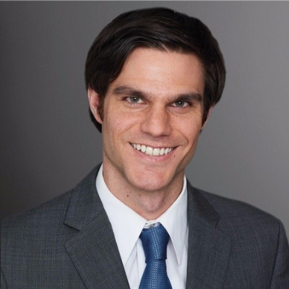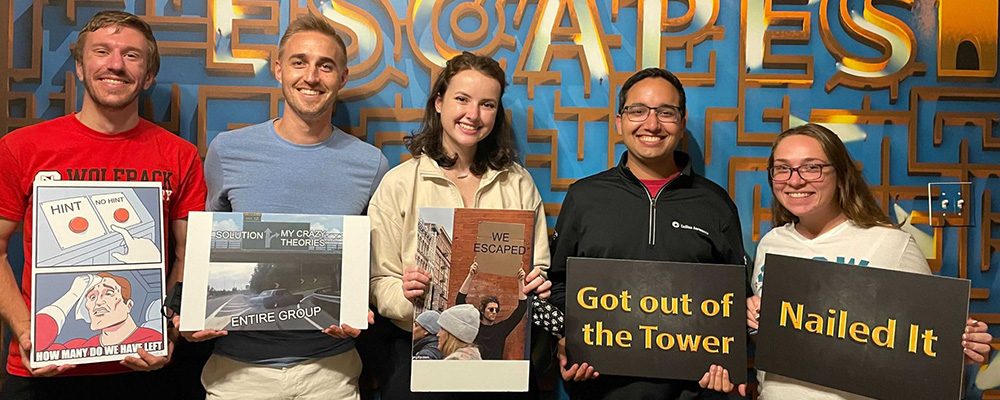
Kevin Danchisko ‘17 is a second-year Senior Associate at Ankura Consulting in Washington, D.C. Kevin learned about NC State’s MS in Analytics (MSA) program while conducting research for The Advisory Board, and became intrigued by the ways in which data could be used for process improvement. During his time as an MSA student, Kevin explored many industries before making the shift to consulting. Two years later, the roles have reversed as Kevin has returned to the Institute for Advanced Analytics to recruit current students to work alongside him at Ankura. Today, Kevin gives us some insight into his experiences with the Institute’s employer information sessions as a student and, now, as an alumni recruiter.
Coming from a career in education research, how did you become interested in pursuing data analytics?
At EAB (the Education Advisory Board), I conducted research into how chief information officers and their teams could improve analytics efforts at higher education institutions. Through over 100 conversations with IT and analytics professionals, I became fascinated with how colleges were using data to improve student learning and campus operations. I also learned that data can solve countless business problems, but there is a shortage of talent to tackle those issues.
As part of my research, I actually interviewed Dr. Rappa about the Institute and its interactions with the broader university. At the end of our discussion, he encouraged me to apply to the MSA program. I went from studying the implementation of analytics in universities to studying analytics at a university.
Did you have any specific goals or expectations in place for your time at the Institute? This could be in terms of academic/personal/professional development, job placement, etc.
I came from a largely qualitative background, with an undergraduate degree in anthropology from Notre Dame (Go Irish!) and most of my work experience in research/consulting. One of the reasons that I chose the Institute was that I would be able to gain the analytical programming skills I needed in an accelerated master’s program. I went from having no programming skills to several certifications by the end of the program, and now I use SAS and Tableau every day in my job.
Another skill that I wanted to continue to develop was leadership. I was lucky to be chosen as lead of a talented practicum team with Anthony Borelli, Caroline Hughes, Drew Lanning, and Annabel Maschal. I grew immensely in my management skills and confidence in leading a team, and I learned just as much from my team as I did through the rest of the program.
Looking back on your job search process, how did the MSA’s employer information sessions impact your interests or motivations when interviewing with companies and ultimately accepting a job offer?
As someone who was changing industries and careers, I wanted exposure to a variety of potential jobs and employers. The information sessions were an excellent way to learn what opportunities were available to me, including some that I never would have considered on my own. Without them, I doubt I would have ever known about the company where I work now, so I’m grateful to the Institute for making that introduction.
The interview process was intense—I think I wound up participating in about 50 interviews with over 20 companies. The employer information sessions helped me identify the companies in which I had the most interest and provided insight into company culture and day-to-day responsibilities that no online research could have accomplished.
You’ve recently returned to the Institute with your team at Ankura for an employer information session. How did it feel being on the other side of the recruitment conversation? Do you have any advice to help current students make the most of their interactions with employers who visit?
It was great being on the other side, because I didn’t have to worry about getting a job! I enjoyed learning more about this year’s students, and I’m always impressed at the quality of students the Institute attracts. I hope they were similarly impressed with Ankura.
It’s easy to forget that the employer representatives and the students both have the same goal—making an impressive and lasting first impression. Asking a thoughtful question—especially one that makes the employer stop and think—can help students make that great first impression. Don’t just ask about what people enjoy about their jobs, but also ask about what they wish was different.
Finally, you’ve been with Ankura Consulting for well over a year now. Can you talk a bit about your current work? What do you enjoy most about your work and what do you look forward to as you continue your career?
I’m on the analytics team in our Litigation, Arbitration, & Disputes division. Our team conducts data analysis for bankruptcy and mass tort issues. Most of my work is related to very large settlements. I’m the lead analyst on multiple of these settlements, some involving more than $1 billion in assets. My work includes forecasting claim volume, estimating liability, and analyzing the performance of our models.
One skill that I wanted to develop at Ankura was creativity, and I’ve been fortunate to have a manager who has supported my growth of that competency. A primary responsibility of mine is to develop dashboards to help our team look at data in different ways and improve our analyses. As my career progresses, I’m looking forward to improving my data visualization skills and applying them to new projects.
Data Column | Institute for Advanced Analytics
The Collaborative Blog for Students in the Master of Science in Analytics
